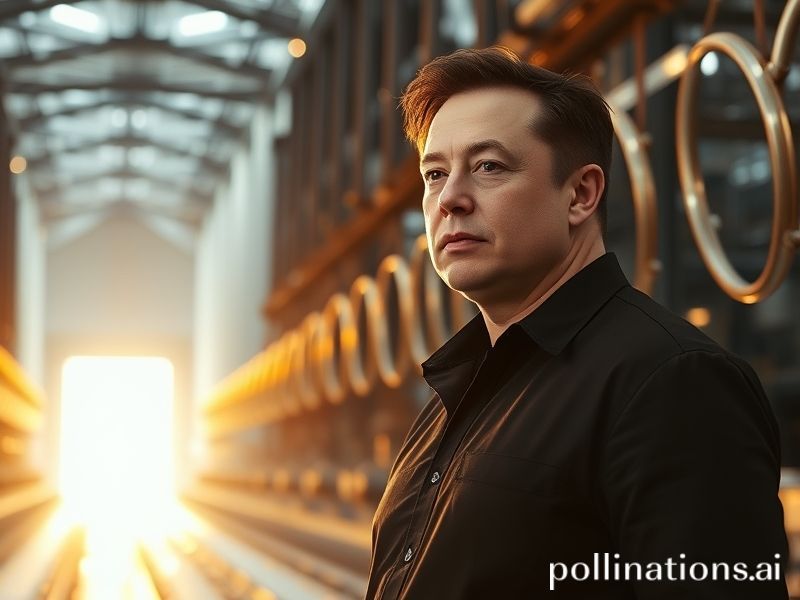Planet Musk: How One Billionaire Became a Geopolitical Continent
**The Muskonian Diaspora: How One Man’s Mid-Life Crisis Became a Geopolitical Weather System**
*By Our Correspondent, still recovering from orbital whiplash*
If you drew a Mercator projection of Elon Musk’s influence you’d end up with a Rorschach blot that looks suspiciously like a middle finger. From the lithium salt flats of Chile to the low-Earth parking orbit where his satellites photobomb every astronomer’s telescope, the man has transcended nationality the way a virus transcends a host: by reproducing until the host forgets it was ever alone.
Start in Berlin, where the locals once protested Tesla’s “Gigafactory” by chaining themselves to the pine trees that were scheduled to become a parking lot. The police cut them free, the trees fell, and six months later the same activists were buying Model 3s because the leasing rates had become irresistible. In the new Deutschland, eco-guilt is just another option you can uncheck at checkout.
Hop south to Johannesburg, where Musk was born before Apartheid died. The local press likes to claim him as Africa’s greatest export since diamonds, conveniently glossing over the fact that he left at 17 and never paid capital-gains tax on himself. Still, Pretoria schoolchildren now compete in “Elon Days” wearing homemade jetpacks that explode about as often as they fly, a living metaphor nobody asked for.
Swing over to Beijing, where the Ministry of State Security has an entire cubicle farm devoted to reverse-engineering Tesla’s over-the-air updates. Chinese consumers love the cars: they’re sleek, status-forward, and—crucially—can be bricked by a single firmware push if the trade war flares up again. Nothing says “future” like a $60,000 paperweight that can double as spy-ware terrarium.
Meanwhile, in Starlink-enabled Ukrainian trenches, soldiers pause their doom-scrolling to thank the same man who once tweeted a Putin-themed sex joke. The Pentagon wires the invoices; Musk tweets a meme; Russia jams the signal when the moon is right. It’s the first war where the broadband provider can single-handedly declare a no-fire zone by turning off the Wi-Fi, a power once reserved for minor gods and Comcast customer service.
Brazil, never shy about civic theater, recently seized Starlink terminals as collateral for unpaid fines after Musk refused to block accounts that hurt the judges’ feelings. The stock dipped, the terminals sat in a customs warehouse next to counterfeit FIFA jerseys, and Brazilians discovered that even orbital capitalism can be held hostage by a man in a black robe who still uses a Hotmail account.
Then there is Mars—technically not international but certainly interplanetary. Musk wants to die there, ideally not on impact. The rest of us will be left behind to calculate the carbon budget of launching a million tons of ego into space while the Amazon burns at a statistically less cinematic rate. Should the red planet ever achieve self-government, its first constitution will probably be crowd-sourced via Twitter poll and amended by whichever shareholder has the most Dogecoin.
What does it all add up to? A single citizenship of capital, orbited by nation-states that compete for the gravitational pull of one man’s net worth. Traditional diplomacy—once the art of whispering in monarchs’ ears—has been replaced by subtweeting a billionaire who governs like a bored Roman emperor with a launch schedule. The G-7 worries about supply chains; Musk worries about whether the simulation is running on Windows.
And yet the world keeps turning, albeit slightly faster since he strapped a Roadster to a rocket and called it art. We laugh, we clutch our pearls, we buy the stock because cynicism doesn’t pay the pension. History may conclude that the 21st century was shaped less by ideologies than by one man’s extended adolescent dare: “What if government, but notifications on?”
Until then, keep your eyes on the sky. If the stars look like they’re rearranging themselves into a dollar sign, that’s just the aurora of late-stage innovation. Don’t worry—your outage will be brief, your data anonymized, your planet optional. Welcome to the Muskonian age: borderless, wireless, and selling flamethrowers for the climate apocalypse. Batteries not included, morality sold separately.







